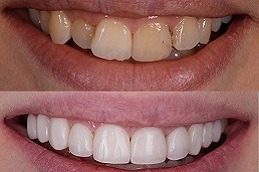Dental veneers are one of the most sought-after cosmetic dental procedures, especially in places like Dubai, where aesthetic appeal is highly valued. These thin shells of porcelain or resin are applied to the front surface of teeth to improve their appearance. Whether you’re dealing with stained, chipped, or misaligned teeth, veneers provide a solution that enhances your smile and boosts confidence. But one of the most appealing features of dental veneers is their long-lasting results. In this article, we’ll explore how Dental Veneers Cost Dubai can offer enduring benefits, what factors influence their longevity, and how to maximize the lifespan of your veneers.
What Are Dental Veneers?
Dental veneers are custom-made shells, typically made from porcelain or composite resin, designed to cover the front surface of your teeth. The procedure involves removing a small amount of enamel from the teeth to accommodate the veneers, ensuring a natural fit and appearance. Veneers are designed to address a range of cosmetic issues such as discoloration, cracks, misalignment, or worn-down teeth.
Porcelain veneers are often the preferred choice due to their durability and ability to resist stains, mimicking the natural translucency of teeth. Composite resin veneers, though less durable than porcelain, are more affordable and can be a great option for those on a budget.
How Long Do Dental Veneers Last?
One of the most frequently asked questions about dental veneers is how long they last. On average, dental veneers can last anywhere between 10 to 15 years with proper care. Porcelain veneers, in particular, are known for their longevity, while composite resin veneers may need to be replaced every 5 to 7 years. However, the longevity of veneers depends on several factors, including the type of material used, the patient’s oral hygiene habits, and lifestyle choices.

Factors Influencing the Longevity of Dental Veneers
-
Material Choice: Porcelain vs. Composite ResinAs mentioned earlier, porcelain veneers are more durable and stain-resistant than composite resin veneers. Porcelain is less porous and more resistant to wear and tear, making it a long-term solution for enhancing the smile. Composite resin, while effective, may not offer the same level of durability and may require more maintenance over the years.
-
Oral HygieneGood oral hygiene is crucial to maintaining the longevity of dental veneers. Brushing and flossing regularly to remove plaque and food particles will prevent the buildup of bacteria that can damage the veneers and cause decay in the underlying teeth. Additionally, regular dental check-ups will ensure that your veneers are intact and healthy.
-
Lifestyle HabitsCertain habits can impact the lifespan of your dental veneers. Smoking, for instance, can stain the veneers and decrease their aesthetic appeal. Consuming coffee, tea, and red wine in excess can also lead to discoloration, even if porcelain veneers are resistant to stains. Furthermore, habits like teeth grinding (bruxism) or using teeth as tools can chip or crack the veneers, shortening their lifespan.
-
Accidental DamageWhile dental veneers are durable, they are not invincible. An accidental fall, trauma to the face, or biting on hard objects can cause the veneers to crack or chip. This is why it’s important to be cautious about the activities you engage in and wear protective gear if necessary, such as a mouthguard during contact sports.
-
Proper Fit and InstallationThe way veneers are applied also plays a role in how long they last. A well-trained dentist will take precise impressions of your teeth, ensuring that the veneers fit perfectly. Any slight misalignment can lead to issues such as discomfort or the veneers coming loose over time. Ensuring the correct application by an experienced dentist is essential for long-lasting results.
Maximizing the Lifespan of Your Veneers
To ensure that your Dental Veneers Cost stand the test of time, here are some tips for proper maintenance:
-
Practice Good Oral HygieneBrush your teeth at least twice a day with a fluoride toothpaste and floss daily. Regular cleaning helps prevent plaque buildup and reduces the risk of gum disease, which can affect the adhesive bond of the veneers to your teeth.
-
Avoid Teeth GrindingIf you grind your teeth at night, talk to your dentist about getting a custom night guard to protect your veneers. Bruxism can cause excessive wear and tear, leading to damage or early replacement of the veneers.
-
Be Mindful of What You EatAvoid chewing on hard foods such as ice, pens, or nails, as this can cause veneers to crack. Also, reduce the consumption of stain-causing foods and drinks, or at least rinse your mouth with water afterward to minimize discoloration.
-
Visit Your Dentist RegularlyRegular dental check-ups are essential for maintaining your veneers. Your dentist will inspect the veneers, clean them professionally, and monitor the overall health of your teeth and gums. Catching potential issues early can prevent major problems down the road.
-
Protect Your SmileIf you play contact sports or engage in activities that could risk damage to your teeth, consider wearing a mouthguard. This will provide an extra layer of protection against accidents and trauma.
Conclusion
Dental veneers are a great investment for anyone looking to enhance their smile and achieve long-lasting, natural-looking results. With proper care, porcelain veneers can last 10 to 15 years or even longer, providing you with a durable and aesthetically pleasing solution. By maintaining good oral hygiene, avoiding habits that can damage your veneers, and seeking regular professional care, you can ensure that your veneers continue to serve you well for many years to come.
This post was created with our nice and easy submission form. Create your post!





